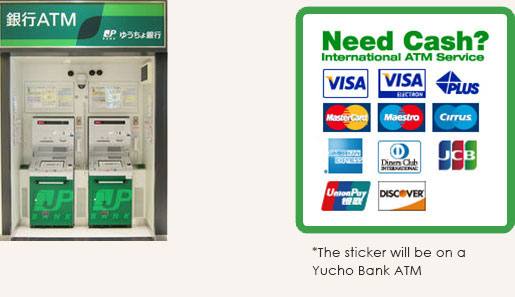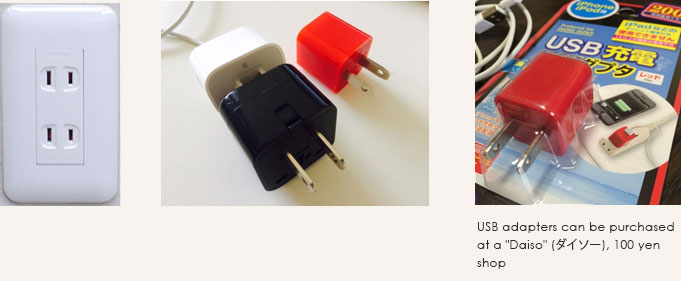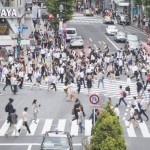5 Things you need to know before you go to Japan
Once you have decided that your next travel destination is Japan, what do you need to know to prepare for your trip to Japan? The following is a list of 5 things you need to know before you go to Japan.
1. Passport and visa requirements for Japan
Passport validity:
Your passport must remain valid during the period of your stay in Japan. There is no minimum period of validity required.
Visa requirements:
Australia and New Zealand Passport holders have a Visa Exemption for short term stays of up to 90 days. Upon arrival in Japan, you will be issued with a “Temporary Visitor” entry status stamp.
Nationals of countries which do not have a “Visa Exemption” with Japan must obtain a visa. Check the Ministry of Foreign Affairs page for information about Japan’s visa requirements – http://www.mofa.go.jp/j_info/visit/visa/
For more details, please direct all visa-related enquiries to the Consulate-General of Japan in your nearest city. → http://www.au.emb-japan.go.jp/en/consulate/index.html

2. Money of Japan
Currency:
The Yen ¥(円) is the unit of currency in Japan. There are six denominations of coins, 1, 5, 10, 50, 100 and 500 yen and four denominations of notes, 1000, 2000, 5000 and 10,000 yen.

Cash vs Credit card in Japan:
You might use your credit or debit cards everyday in Melbourne, but you will find that it is not possible in Japan. Also, in Australia, you would not see the highest denomination note, the $100 note, very often, but the highest denomination note in Japan, the 10,000 yen note, will be seen and used frequently. Because Japan is still very much a cash society, make sure you don’t run out of cash in your wallet. However, credit cards are acceptable at a wide variety of merchants such as convenience stores, department stores, restaurants and major hotels.
Expected normal costs/Spending Money:
How much money will you need in Japan?
You might believe that Japan is expensive, but it is not true. Here are some comparisons of drinks, foods and other every day items (prices are approximate):
| Drinks | Price in Japan | Price in AUS |
| Can of Coke (350 ml) | 130 yen (approx. $1.40) | $2.50 |
| Bottle of water (500ml) | 110 yen (approx. $1.20) | $2.50 (600 ml) |
| Bottle of soft drinks (500 ml) | 150 yen (approx. $1.60) | $3.00 |
| Can of beer (350 ml) | 230 yen (approx. $2.50) | $4.50 (375 ml) |
| A mug of beer (300-455 ml) at a pub | 500 yen (approx. $5.40) | $6.00 (425 ml) |
| Foods | Price in Japan | Price in AUS |
| Big Mac Meal | 670 yen (approx. $7.30) | $9.00 |
| A loaf of bread (340g) | 170 yen (approx. $1.90) | $2.20 |
| Breakfast (for one person) | 500~800 yen (approx. $5.50-8.70) | $8.00-25.00 |
| Lunch (for one person) | 500~1500 yen (approx. $5.50-16.00) | $10.00-25.00 |
| Basic dinner (includes a drink) (for one person) |
1500~3000 yen (approx. $16-32) | $25.00-40.00 |
| Items | Price in Japan | Price in AUS |
| Metro train ticket | 310 yen (approx. $3.30) – one way ticket maximum | $3.76 – Full Fare 2 hour ticket |
| Taxi ride – 7km | 2,350 yen (approx. $25.50) | $18.00 |
| A packet of cigarettes | 460 yen (approx. $5.00) | $22.00 |
Admission fees to temples and shrines are usually 300-700 yen and museums are around the 500-2000 yen mark.
The spending money required for one day in Japan for items such as breakfast, lunch, dinner, snacks and drinks, plus transportation and admission fees could be covered by 10,000 Yen, which is approx. $110. It might not be enough if you are planning to an Izakaya (居酒屋), Japanese pub, and have a lot of drinks or if you would like to go to luxury class restaurants for dinner.
Getting Money:
Travellers Cheques
Travellers Cheques are accepted by leading hotels, ryokans, stores and some duty free shops. They can also can be exchanged at major banks.
Credit/Debit Cards
Credit Cards from major international brands (such as VISA, Mastercard, American Express, Diners, JCB) are accepted at a wide range of merchants, however, debit cards are not very common and are unlikely to be used at any merchants.
ATMs
Yucho Ginko (ゆちょ銀行), Japan Post Bank:
You can withdraw cash using your credit cards and accepted debit cards at over 26,400 ATMs throughout Japan using Yucho Ginko (ゆうちょ銀行) (Japan Post Bank) with the sign “International ATM Service”. The ATMs are available with English guidance.

Seven Ginko (セブン銀行), Seven Bank:
Currently there are 21,357 ATMs (June 2015) at 7-Eleven Convenience stores all over Japan. Almost 24 hours a day, you can withdraw cash using the accepted credit and debit cards of major international brands. The ATMs are available with English guidance.

Of course, there’s always the option to get some Japanese Yen before you go to Japan!
Personally, when I go to Japan, I usually prepare JPY50,000 cash for a 2 week stay in advance and then if I run out of cash, I withdraw money using the Seven Bank or Yucho Bank. You can get money from the bank when you arrive in Japan, but you don’t know what will happen with the exchange rate. It would be a good idea to lock in the current rate and prepare some money in advance. (It’s not necessary to get a huge amount, but if some local currency is in your wallet when you arrive in the country, you don’t need to rush around finding the ATM! Stress free!)
Need more info? – https://www.japanexplorer.com.au/how-much-cash-should-i-take-to-japan/
Tipping:
You should never tip in Japan. Is it true? Tipping is not mandatory in Japan. But there is a certain etiquette of “gratuity” (心付け – Kokoro-duke) and the unique Japanese culture makes this topic a little bit complex. Many Japanese people are not used to the practice of tipping and also they are not expecting to receive a tip. At restaurants, hotels, using a taxi and using a public toilet, most situations do not require a tip.
Some people say that tipping in Japan is rude, but this is not true in regards to the act of tipping itself. Tipping by handing over cash might be considered an impolite act and Japanese people can be in two minds of “should I take this, or not…?”. If you do decide to tip, it might be ideal to place a tip into a small envelope and hand it off. I personally believe that when people who work in the hospitality industry have a chance to get a tip from customers, receiving that tip would be gratifying, whether it is in an envelope or not. Even if there is no common practice of tipping in Japan, people understand the meaning of “tip” and why a tip is offered – an appreciation or a compliment of service. Simply, you should tell them “it is a tip for you and your hospitality”.

3. Mobile phones & Internet (Wifi)
Are you going to be insecure without your mobile/smart phone and internet? Or perhaps you don’t want to be interrupted on your holiday, particularly a call from work. Do you really need a phone?
If you are not worried about phone calls and simply want to enjoy your holiday, that would be great! But, you might have circumstances or some reason that you need a phone. Here are a few options for making or receiving phone calls and using internet on your mobile devices in Japan.
Firstly, you can always check to see if your phone is compatible with the phone frequencies used in Japan. These days, most phone companies offer a higher frequency range and using your own mobile phone while ‘roaming’ around Japan can be an option, but it does come with it’s own costs.
Another option is to hire a phone for the time you are in Japan. Compared to roaming, you would have a fixed amount that you would pay to have your hired phone available to make and receive calls and to use the internet.
These days, there are a lot of options for ensuring you can still communicate while in Japan. Another of those options includes a travel SIM card and there are a number of companies offering this product. You may even be able to use your existing number while using this service.
While Japan is a high-tech superpower, the Wi-Fi connection and availability across the country still has a long way to go to become a convenient service for the traveller. However, there is Wi-Fi available and, if you prepare, you are able to get free Wi-fi organised before you leave for your holiday. There are a number of apps which offer the convenient service of locating all free Wi-Fi connections with one user name and password. If an internet connection is all you need and you are happy to use your internet if and when the Wi-Fi is available, this free option may be your best choice.
But the thing is…. there are probably a lot of free wifi spots that can be found, however the process might be in Japanese! If you find one and you cannot read Japanese, it’s useless. (Thankfully, Seven-eleven has free wifi access at the every shop in English!)
One of the most convenient ways to stay connected while you explore Japan is to get a SIM card. Even if you get one SIM, you may still be able to share the connection using your personal hot spot! (check with the provider as many don’t allow this – our Prepaid Japan Travel Sim does!!).
Get a SIM Card before you go to Japan! – https://www.japanexplorer.com.au/japan-travel-sim-cards/
4. Electricity and Voltage
Voltage -100 volts, A.C. throughout the country
Frequency – 50 Hertz in eastern Japan and 60 Hertz in western Japan (including Nagoya, Kyoto and Osaka).
Plugs – 2-flat-pin plugs

5. Emergency Information
Police: 110
If you need to report a crime, accident or other emergency, you can call 110 from any telephone. Public phones do not need a coin to call emergency services. Police boxes (Koban) are also available to report a lost or stolen item, or if you are lost. (Lost and Found is also available – 03-3814-4151)
Ambulance/Fire: 119
Ambulance services are provided by the Fire Department, dial 119 to request an ambulance from any telephone.
The Japan Help-Line: 0120-461-997
Japan Helpline is Japan’s only 24 hour, nationwide assistance service for the international community. They will help you with a range of matters from an earthquake to just a toothache.
The AMDA International Medical Information Centre:
The AMDA provides telephone services to foreigners in Japan in several languages, and can introduce you to medical facilities with staff who speak your language.
Tel: 03-5285-8088 (Tokyo)
Tel 06-4395-0555 (Osaka)
Australian Embassy/Consulates:
Your embassy is often a good first point of contact in an emergency.
Australian Embassy
Tokyo
Tel: 03-5232-4111
Address: 2-1-14, Mita, Minato-ku, Tokyo
Australian Consulate-General
Osaka
Tel: 06-6941-9271
Address: Twin 21 MID, Tower, 16F., 2-1-61, Shiromi, Chuo-ku, Osaka-shi
Fukuoka
Tel: 092-734-5055
Address: Tenjin Twin Bldg., 7F., 1-6-8, Tenjin, Chuo-ku, Fukuoka-shi
Sapporo
Tel: 011-242-4381
Address: Sapporo Centre Bldg., 17F., 6-2, Nishi, Kita 5-jo, Chuo-ku, Sapporo-shi





